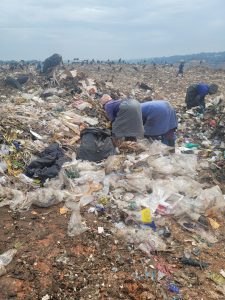On 29 March, Global Green Growth Institute (GGGI) and Korea International Cooperation Agency (KOICA) staff visited the Kiteezi landfill to check the status quo of the landfill, collect information on how the landfill is managed, observe how much waste is coming in and out, how data is managed by KCCA, and to identify challenges. This visit is in-line with the ongoing work to develop the solid waste management strategy for the Greater Kampala Metropolitan Area (GKMA) and bring evidence on waste to resource approaches, a strategic path to scale-up proper waste management in Uganda.
It reflects on the “Smart City” campaign by Kampala Capital City Authority (KCCA) to maintain waste-free cities. The key actors in the landfill are: i) waste pickers including women and youth ii) middlemen, iii) traders (have contacts of the big industries), and iv) truck loaders. All of them are paid by the private sector (buyers/recycling businesses).
GGGI, and KOICA being mindful of the social-economic and environment of waste are undertaking a consultative process and mass engagement of all stakeholders. These include landfill management; the informal waste pickers such as women and youth, private companies, and municipal and division leaders are consulted and highly involved to propose scalable solutions.

The Country Representative of the GGGI Uganda office Dagmar Zwebe said that the volumes of waste have doubled since her last visit two years ago and is in a worrying stage. Approximately there are 150 waste trucks varying from 2 tonnes to 16 tonnes (27 KCCA trucks, the rest private trucks) in Kampala.
Presently, the landfill has reached its maximum capacity, and arrangements to relocate to another area are underway to Ddundu. KCCA seeks to set up a waste treatment facility at the new location in a bid to have longer use of the landfill and conserve the environment and its plans are underway. It is estimated that approximately 70-100 tonnes of waste from the landfill are taken away per day by waste pickers. The rest of the waste is left at the landfill. More still, the leachate treatment plant constructed in 2001 with support from World Bank is old and unutilized especially with power outage. Leachate is often released to the streams without proper treatment, which is a high environmental pollution.

In 2017, GGGI developed a (UGGDS) 2017/18 – 2030/31 recommended the need for comprehensive economic physical planning and efficient waste management (solid and wastewater) for at least five cities and 15 municipalities. According to the World Bank Report (2018), with the increasing urbanization, the global generation of Municipal Solid Waste (MSW) is expected to increase to 3.4 billion tons by 2050. Annually, 1.9 billion tons are estimated, each person contributing 218 kg of MSW to this projected total. Due to the current high urbanization, Kampala has grown to include the GKMA – Entebbe, Wakiso, and Mukono spanning 189 square miles. Kampala Climate Change Action, 2016 estimated 350,000 tons generated in Kampala per of which only 70% is disposed.
Important links:
https://twitter.com/DagmarZwebe/status/1508699262422597632?s=20&t=DFQ0WlVrL17yVu9K3GtoQQ
https://twitter.com/ali_thar9380/status/1508764292908208135?t=dDoStw_P5z5iUD6Uw4vsyw&s=19